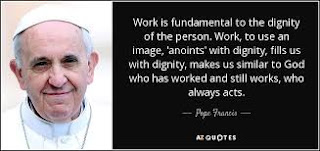Unlike so many of us who fret about what our future holds, St.
Mary Elizabeth Hesselblad prayed, “Dear Lord, I do not ask to see the path….” How
can we learn that sense of trust?
Fr. John Kavanaugh gives us a clue in a meditation on the
story of the road to Emmaus, when he observes, “And then Jesus meets them on
the way. He doesn’t come to them in Jerusalem. He doesn’t wait for them at
home. Rather, he meets them where they are—on the road, amid their journey,
right smack in the middle of all the pain, frustration, and despair that
threatens to overwhelm them.”
As St. Mary Elizabeth knew, it is not necessary to see the path, because no matter what path we find ourselves on, Christ is already there. The same understanding is expressed
in Psalm 139: “…from your presence, where can I flee? If I go to the heavens,
you are there; if I sink to the nether world, you are present there. If I take
the wings of the dawn, if I settle at the farthest limits of the sea, even
there your hand shall guide me….”
Antonio Machado said, “Traveler, there is no path. You make
the path by walking.” And so we walk in trust, knowing that whatever path we traverse will be blessed because we never walk alone.











